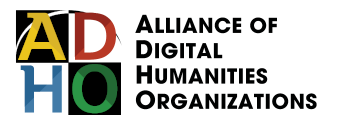About
ADHO sponsors Special Interest Groups (SIGs) to enable members across different ADHO Constituent Organizations (COs) to exchange ideas, keep themselves current on pertinent developments, and mobilize in pursuit of related activities and goals. An ADHO SIG is a research or activity grouping of scholars initiated and run by a group of individuals who are members of an ADHO CO and who share a self-defined ‘special interest’ within the areas of scholarship in which ADHO and its COs are active. In this way, SIGs represent key elements in the breadth and depth of the ADHO community, though they do not speak directly for ADHO, its committees, or its COs.
Current Special Interest Groups
- AVinDH – Audiovisual Data in Digital Humanities
- DH Pedagogy and Training
- DHTech
- DH-WoGeM – DH Women and Gender Minorities
- SIG-DLS – Digital Literary Studies
- GeoHumanities
- Global Outlook::Digital Humanities (GO::DH)
- Libraries and Digital Humanities
- Linked Open Data
- Multilingual Digital Humanities (SIG Multilingual DH)
How to Form an ADHO Special Interest Group
ADHO invites all members of Constituent Organizations to propose a Special Interest Group. You can check out the SIG protocol here. If you have any enquiries, please direct them to the ADHO SIG liaison, Simone Rebora, simone{dot}rebora{at}univr{dot}it.
